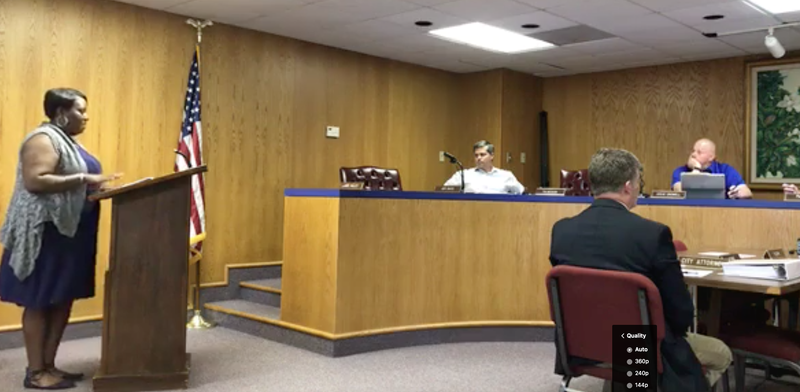A Magnolia-based nonprofit has proposed levying a $1 cigarette tax for every pack sold within the county.
Speaking before the Magnolia city council on Monday, Cynthia Johnson, the founder and director of Calhoun Heights Community Outreach, stated her initiative was “not about the money,” but instead to deter people from smoking.
“Most people tend to buy products regardless of the price,” she said. “If they’re going to do it, they’re going to do it. But if we raise the price, nine times out of 10, it's going to lessen their use – which creates a health impact to them.”
Johnson also stated that tobacco use was the number one preventable cause of disease or death in America and that lower income citizens use more tobacco than the rest of the population.
The idea for the tax came after a presentation from the Arkansas Minority Research Center to Johnson’s organization. She did not know of any other cities or counties within The Natural State that levy such a tax, but said that some municipalities in Alabama and New York have similar taxes already on the books.
The proposed tax would only apply to cigarettes and not smokeless or individual cigars and smoking paraphernalia. Johnson said the tax either has been or will be proposed to all cities within the county, as well as the county government itself before moving forward.
“It’s a win-win situation as far as the budgeted new-generated revenue for the cites and the county,” she added.
The tax revenues, she suggested, could be put toward “education” and city projects to improve recreational options.
The $1 tax amount was settled upon after Johnson met with mayors within the county. She claimed that, after surveying two stores in Magnolia, some 2,000 packs of cigarettes per day were sold, therefore at least $14,000 could be generated on a weekly basis.
McNeil, Waldo, and Taylor are already on board with the tax, according to Johnson. She said she is now only waiting to hear Columbia County's stance on the proposed issue.
The tax would be collected through the state, then dispersed back down to the county treasurer for distribution within Columbia County, according to Johnson.
The levying of such a tax, however, is more complicated than a city or county simply wishing to enact it. Alderman Jamie Waller questioned whether the levying of such a tax would even be passable at all by a city council, without first putting the issue up for vote on public ballot.
“Do we have discretion to even do something like this without the vote of the citizens?" he asked.
City Attorney Mike Boyd in a response stated that he “seriously doubted” that such a motion would be legal without the public vote, and that the procedural matter of the tax would have to be looked into further.
“Most likely, it would have to put on [the ballot] for a special election or on the next election,” he added.
It was also unknown whether any such legislation has been discussed among the state government.
“It sounds like a windfall for everyone,” said Alderman Steve Nipper. “I’m wondering whether the state is involved with this already.”
But the Arkansas state legislature is indeed already looking into a cigarette tax -- one that is intertwined with a recently proposed major tax cut for low- and middle-income state residents.
Introduced March 14 in the Arkansas Senate, SB 571 was brought forth as a bipartisan action to cut $97 million in taxes for residents earning less than $22,200 annually. According to the bill’s language, an Arkansan making $0-$4,499 per year, under the new bill, would see a zero-percent annual state income rate; while $4,500-$8,899 earners would see a 1-percent rate; $8,900-$13,399 would be 3 percent, and $13,400-$22,199 would be 3.4 percent.
To make up for potentially lost revenues from the tax cuts, the bill also introduced a tobacco tax hike, that, according to a March ABC 7 Little Rock news report, would levy a 20-percent excise tax on cigarettes for an estimated additional 80 cents on every pack sold. The bill also would impose a privilege tax on e-cigarettes and vapor products. The state has not raised its tobacco tax rate since 2009.
The bill also indicates that the proposed additional taxes on cigarettes would be used “to help offset the costs to the state of covering the treatment of tobacco-related illnesses.”.
“The lost revenue would be offset by increases in taxes on cigarettes and vaping,” said Arkansas Senator Bruce Maloch in his March 22 state capital update. “The bill’s sponsors say that revenue from tobacco taxes is much less than the cost to the state for treating Medicaid patients with tobacco-related illnesses. The gap is $500 million a year.”
SB571 is currently still tied up in the state legislature. It narrowly passed the state Senate on March 20 and was then forwarded to the Arkansas House of Representatives for possible revisions. No action has been taken on the bill since April 9, according to Arkansas State Legislature records, when the bill on that date was returned to the Senate, then returned again to the House.
Since it has not been passed by both state houses and signed into law by the governor, the proposed taxes are not yet on the books. If passed, the tobacco and e-cigarette tax, as well as the tax cuts, would go into effect Jan. 1, 2020.
Note: This article was updated at 10 a.m. April, 24.

